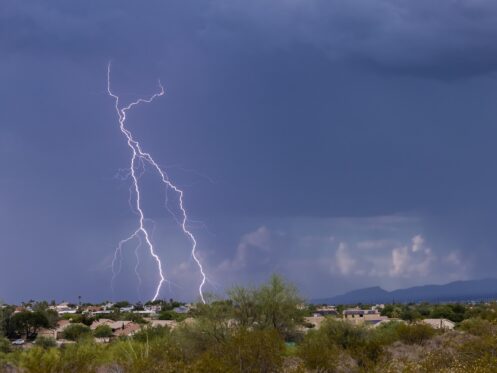Storm season can bring strong winds and lightning strikes that can be a major risk to your home. As a Glendale resident, you know that protecting your property goes beyond securing windows and doors. Your electrical system is also an important part of your home’s safety. Proper preparation for these storms can prevent damage, reduce outages, and keep your family safe during severe weather.
In this guide, we’ll explore practical steps to take when you’re preparing your home’s electrical system for storm season.
Understanding the Risks to Your Electrical System
Before diving into preparation, it’s essential to understand how storms can affect your home’s electrical system. Lightning strikes are one of the most immediate threats to your home because a sudden surge of electricity can travel through power lines and wiring. This can damage appliances and electronics, not to mention your electrical panel itself. Beyond the visible damage, power surges can silently degrade sensitive devices over time, reducing their lifespan and performance.
Strong winds bring their own set of challenges. Downed power lines, broken branches, and flying debris can create immediate hazards outside and increase the risk of electrical fires or electrocution if lines come in contact with your home. Even when damage isn’t visible, fallen lines or weakened infrastructure can cause intermittent outages, flickering lights, or unusual sounds that signal potential danger.
Heavy rain and flooding create another layer of risk, particularly for wiring in basements, crawl spaces, or other low-lying areas. Moisture can get into outlets and switches, increasing the chance of short circuits or ground faults. Repeated exposure to moisture can corrode electrical components, which can then lead to unexpected failures and costly repairs. Don’t overlook even minor storm-related issues. Tripped breakers and flickering lights can indicate vulnerabilities that might worsen during severe weather.
Inspecting Your Electrical System
When you perform an inspection, we recommend that you hire a professional team. At Christian Brothers Air Conditioning Plumbing Electrical, we will be able to identify hidden risks and suggest upgrades that reduce your system’s vulnerability during severe weather. One of the first steps in storm preparation is a thorough inspection of your home’s electrical system. When you contact our team, we will start by examining your main electrical panel to ensure it’s in good condition. We’ll also look for signs of corrosion, water damage, or any outdated components. If your panel is older or frequently experiences tripped breakers, it may be time for an upgrade.
Next, we will check the wiring in your home. Exposed wires, frayed insulation, or loose connections are all hazards that could potentially worsen during a storm. We pay extra attention to areas near windows, doors, or entry points where water could seep in. Our team will also inspect outlets that are outside your home and other outdoor electrical equipment to ensure they are weatherproof. Properly sealed outlets will prevent moisture from entering the system and causing short circuits.
Installing Surge Protection
Power surges are a common storm-related issue. Even if your home doesn’t lose power during a storm, lightning strikes or fluctuations from the grid can damage sensitive electronics, HVAC systems, and appliances. Installing whole-home surge protection offers peace of mind by shielding your entire electrical system from sudden voltage spikes.
Individual surge protectors are also useful for high-value electronics such as computers, home entertainment systems, and medical devices. These devices absorb excess voltage and help to prevent it from reaching your appliances.
Securing Outdoor Electrical Equipment
Storms often leave outdoor electrical equipment directly exposed to the elements. Make sure that you properly ground and securely mount all equipment before storm season starts. You should also elevate equipment where possible to reduce the risk of flood damage. Use waterproof covers for outlets and ensure that extension cords or temporary connections have a rating for outdoor use.
Trees and large branches can fall during high winds and damage exterior wiring or utility poles. Trim back overhanging branches near your home’s electrical lines to minimize the risk of power loss or fire hazards.
Maintaining Your Backup Power Options
Even with preventive measures, storms can cause outages. When storms are common in your area, having reliable backup power can be critical. Portable generators provide temporary electricity during a power cut, but you must use them safely. Make sure fuel is properly stored and never refuel a running generator.
For a more permanent solution, consider a standby generator. These automatically activate during power outages and can power all critical circuits in your home. Modern standby generators run on natural gas or propane and require minimal manual intervention. This offers greater reliability for your family during storm season.
Protecting Sensitive Electronics
Storm-related electrical issues can quickly cause damage to sensitive electronics and other devices. Unplugging these items before a storm hits is the best protection. If frequent storms are common in your area, investing in uninterruptible power supply (UPS) systems for essential devices can provide short-term backup and protect against data loss and hardware damage.
Checking and Updating Circuit Breakers
Circuit breakers are important when it comes to electrical hazards. Make sure that your breakers are functioning as they should and are clearly labeled. Older breakers can fail to trip during an overload, which is a fire risk for your home. If your home has experienced frequent tripping or flickering lights, it could mean that your electrical panel can’t handle your current load. Upgrading your breaker panel helps to enhance your safety and prepare your system to handle storm-related stress.
Securing Your Electrical Outlets
Check all the outlets in your home, especially in areas that are prone to moisture. Ground-fault circuit interrupter (GFCI) outlets will protect you from shock by cutting off electricity when a ground fault occurs. Install GFCI outlets in dangerous locations and test them regularly. For outdoor outlets, weatherproof covers prevent water from entering and causing shorts.
Planning for Emergency Situations
Even the most well-prepared homes may have emergencies during severe storms. Make sure that you always have a plan for power outages that includes flashlights, battery-powered devices, and a communication strategy. Consider labeling breaker switches and critical circuits so that essential systems, like refrigeration or medical devices, remain powered during an outage.
Environmental Considerations
When you prepare your electrical system for storms, it also has environmental benefits. A system that is properly maintained and upgraded will be able to operate more efficiently. Surge protection and safe use of generators will help to prevent energy loss and minimize emergency power use. When you proactively manage your electrical system, you protect your home and reduce unnecessary energy consumption.
Call a Reliable Electrician to Prepare for Storm Season Today
Storm season can be unpredictable, but preparation is an important step to take. Paying attention to circuit breakers, outlets, and sensitive electronics further protects your home and family. Guidance from our team at Christian Brothers Air Conditioning Plumbing Electrical will help ensure that your electrical system is ready for any storm, giving you reliable power when you need it most.
With over 40 years of experience serving the Glendale, AZ area, you can trust us with your electrical needs. Contact us today to schedule an appointment.










